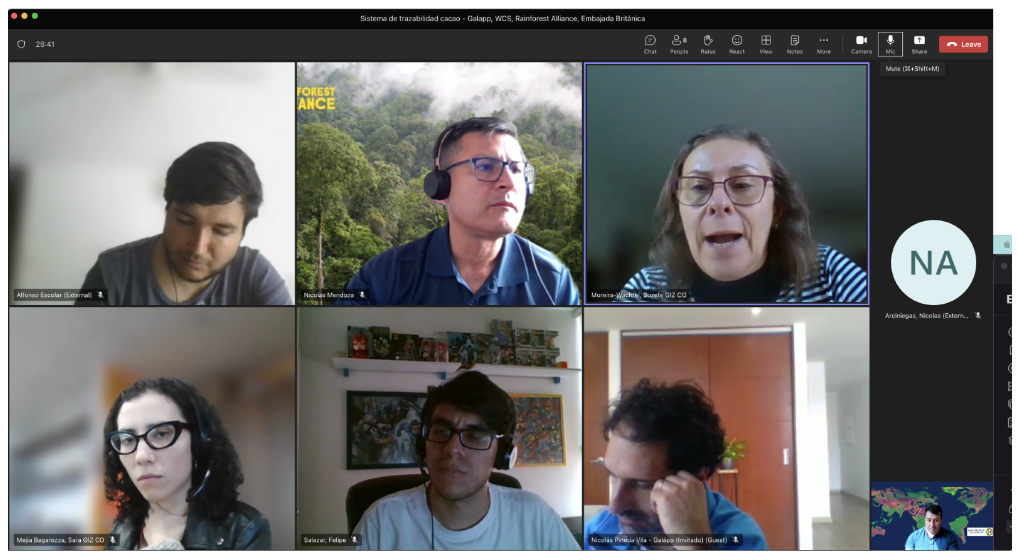Sprint 3: Introducing FOLIA: A Cloud-Based Solution for Monitoring Deforestation and Ensuring EU Compliance
A blog by Carlos Pedraza, a Frontier Tech Hub Implementing Partner.
This post introduces the our pilot’s — Integrating satellite and ground big data to improve cocoa production — solution prototype, FOLIA, and an update from the third sprint
In an age where sustainability, ethical business, and regulatory compliance dominate the global discourse, companies are continually seeking cutting-edge solutions to meet these demands. One of the most pressing environmental issues today is deforestation. Enter FOLIA: the game-changing cloud-based service ensuring businesses comply with the EU's stringent regulations on deforestation.
Developed by Earth Big Data with support from the Frontier Tech Hub funded by the UK government, FOLIA (Latin for "leaf") uses satellite integration with mobile applications. Designed with precision, FOLIA ensures technical adherence to EU regulations. Cacao businesses can effortlessly perform deforestation risk assessments related to their value chains. This not only promotes the importation of deforestation-free cacao agricultural products into Europe but also fortifies the commitment to eco-friendly business practices.
Why FOLIA Stands Out: Features at a Glance
Efficient Data Collection: FOLIA empowers value chain actors with tools to gather crucial information, assessing deforestation risk for every associated farm.
Comprehensive Reporting: Every piece of data collected by satellites and mobile applications is meticulously organized into reports. These provide robust evidence of compliance.
Long-Term Accessibility: Every report and any supporting evidence is archived and accessible for five years, ensuring readiness for EU audits.
Historical Baselines: The system creates a forest extent baseline as of 31st December 2020 and offers consistent monitoring options, be it annually, bi-annually, or quarterly.
Precision: With a staggering accuracy of over 95%, FOLIA guarantees that customers can integrate a genuine, deforestation-free guarantee into their value chains.
How It Works: The Science Behind FOLIA
The very essence of deforestation risk assessment lies in two major variables: the location and extent of farms in the value chain and the earth observations gleaned from satellites.
Companies provide geospatial information if available or utilize FOLIA’s mobile app (powered by GALAPP) to gather this data directly from the field. Deforestation risk assessment is also based on Earth Observation data, using satellites such as Sentinel-1 and Sentinel-2, which revisit locations approximately every 12 days and 5 days respectively, provide regular updates.
This immense wealth of data is then synthesized in the cloud, using advanced analytics. Here’s a peek into FOLIA’s robust analysis procedure:
Initial forest mapping as of 31st December 2020 serves as a reference point. Using a blend of experienced forest mapping techniques and modern analytical tools like random forest and time series analysis, FOLIA ensures confidence in forest estimation.
Tailoring to individual client requirements, deforestation risk assessments are presented annually, bi-annually, or quarterly. Each report meticulously processes satellite data to reduce uncertainties and false readings.
Reporting with FOLIA: Transparency at Its Best
Every piece of data, from satellite imagery timestamps to analytical processes, is stored in the cloud, ensuring complete transparency. This traceability is vital for rigorous auditing processes.
Clients have options. While some might prefer standardized PDF reports detailing the assessment procedure, tech-savvy users can directly access FOLIA's dynamic geospatial platform for a more interactive experience.
Detecting Risks and Offering Solutions
If a deforestation risk is flagged within a farm, FOLIA doesn't stop there. Ground truth data from farmers, alongside satellite information, refines risk assessments. This includes checks against false positives, such as flooding events misinterpreted as deforestation.
Furthermore, FOLIA enhances its risk assessments with geolocation services, protected area analyses, and even reports on intersections with afro communities and indigenous territories in places like Colombia. This ensures businesses aren’t just environmentally compliant, but also socially responsible.
In Conclusion
FOLIA isn't just a tool—it’s a commitment to a greener, more ethical future. As businesses look forward to a world where responsible sourcing isn’t just encouraged but demanded, FOLIA is set to become their most trusted ally in this journey.
Sprint 3, What we tested and what we learned.
During the third sprint, our team achieved some significant milestones that have propelled FOLIA development forward. One notable accomplishment was the creation of our first mockup for FOLIA’s deforestation risk module. Seeing our ideas come to life in a visual format was both exciting and informative, as it provided us with a tangible starting point for further development.
Figure 1: First (left) and second (right) version of FOLIA Mockup as part of the process to design a digital solution for the use of multiple actors associated to Cocoa Value Chain
Equally important was the completion of the initial version of the module's features, meticulously crafted to align with agent responsibilities. This planning ensures that our module seamlessly integrates into the workflows of Cataexport and Fedecacao, which is crucial for its success in their value chain.
Figure 2: Meetings and workshops were implemented with zero deforestation strategies partners in Colombia including GIZ-Germany, GALAPP, Tropical Forest Alliance and WCS lead by the UK Embassy
Our first meeting with agents Cataexport and Fedecacao was a pivotal moment in the project. We had the opportunity to present the deforestation risk module and gauge their interest in its potential integration into their operations. Their enthusiasm and positive feedback reinforced our belief in the module's value and set the stage for a fruitful collaboration ahead. These accomplishments, along with the ongoing discussions, architecture design, code development, and contract preparation, make the team excited about the continued progress of our project.
If this has tickled your taste buds and you’d like to know more please contact:
Earth Big Data: carlos@earthbigdata.com
Frontier Tech Hub: harry@hellobrink.co
If you’d like to dig in further…
📚 Explore the pilot’s profile page


